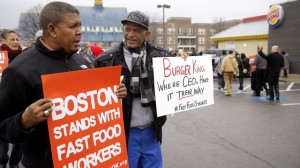
Pedro Rodriguez, right, talks with Andrus Reyes as they participate in a demonstration on a Burger King parking lot as part of a nationwide protest supporting higher wages for workers in the fast-food industry and other minimum wage jobs in Boston, Thursday, Dec. 5, 2013. (AP Photo/Stephan Savoia)
Writing in Friday’s Washington Post, Harold Meyerson reports that Democrats are taking a page out of the Bush playbook in the 2014 midterm elections. But they plan to use a very different issue as their wedge — increasing the minimum wage.
Meyerson:
American liberalism and the Democratic Party — two partially overlapping but by no means identical institutions — have set themselves an unusually clear agenda for 2014: reducing economic inequality and boosting workers’ incomes. These are causes they can fight for on multiple fronts.
Raising the minimum wage should offer the course of least resistance. Although congressional Republicans may persist in blocking an increase in the federal minimum wage, they do so at their own peril. Raising the wage is one of the few issues in U.S. politics that commands across-the-board public support. A CBS News poll in November found that even 57 percent of Republicans support such an increase.
Democrats have concluded that they can turn Republican legislators’ opposition to raising the wage into an electoral issue by using state ballot measures. As states are free to set their own minimum-wage standards — though the rates take effect only when they exceed the federal minimum — Democrats are working to put wage-increase initiatives before voters in states that will have contested House and Senate races in 2014, including Arkansas, Alaska, South Dakota and New Mexico. Such ballot measures have proved an effective way to increase turnout of low-income and minority voters, which can translate into more ballots cast for Democratic candidates.
Immediately after the 2004 election, conventional wisdom held that the state marriage amendments had succeeded in nudging Bush across the finish line. Later, as political scientists dug deeper into the turnout results, that initial conclusion became the source of some controversy.
But the debate was based on comparisons of voting patterns between 2000 and 2004. Midterm elections represent a very different animal. Since 2008, we’ve seen a consistent pattern in which the midterm and presidential election cycles feature divergent electorates. In low-turnout midterms, the voting population has skewed older, whiter and more Republican. Key Democratic constituencies, on the other hand, tend to be less attached to politics. Younger voters, lower income voters, single people and people of color who are motivated to cast a ballot during a presidential election have proven less likely to come out to vote in midterm elections.
In 2014, the big political questions are where public opinion of Obamacare will stand in November, and whether Republicans will again provoke a debt ceiling standoff that might sour their brand. But the larger question is whether historic voting patterns will hold (the party in the White House typically lose seats in the middle of a president’s second term).
One thing to watch on that front is some recent evidence that seniors — who have skewed Republican in recent elections — are shifting away from the Grand Old Party. And if the campaign to raise wages for those at the bottom gains steam in 2014, another is whether low-income voters who typically stay at home during midterms can be motivated by self-interest to get out and vote. If they do, they could — as Meyerson notes – put more money in their pocketbooks and more Dems in office.


